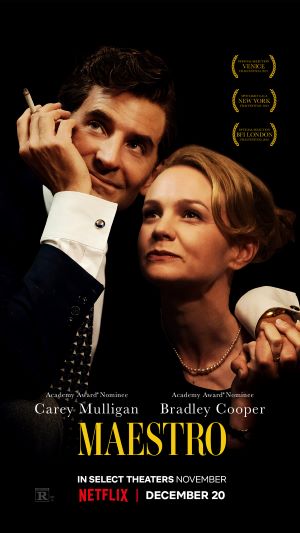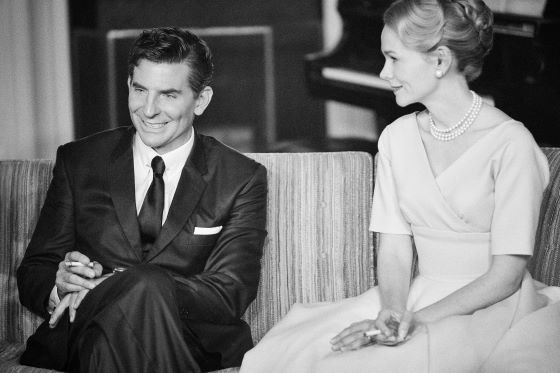

[Rating: Rock Fist Way Down]
Streaming on Netflix December 20
Usually an A-list Hollywood star has to win an Oscar before they are given carte blanche to make something this indulgent, derivative, and abjectly awful, but Bradley Cooper has jumped the line with Maestro. In his quest to finally get his chip, the director/star/script co-author has gone all-in on awards-bait clichés to craft a cinematic Frankenstein made up of disparate pieces that don’t just fail to gel, but seem to be actively fighting against each other. All that’s left is a series of laughable performances that highlight the least interesting aspects of an endlessly fascinating man.
Maestro opens and closes on American conductor/composer Leonard “Lenny” Bernstein (Cooper) in his twilight years as he reflects on his life and his deceased wife, Felicia (Carey Mulligan). It briefly touches on Lenny’s sudden rise to fame in 1943, and then his and Felicia’s meet-cute at a house party some time later after he’d established himself as a minor musical celebrity. It is Felicia who pursues Lenny during the early course of their relationship, yet when the film skips ahead a few decades into their mid-life period, there’s a fractured element to their dynamic.
The movie opens with Lenny in bed with a man, and while he seems genuinely in love with Felicia, the scenes later on in their marriage show him to have a persistent and wandering eye for younger gentlemen. This tension in their marriage becomes the defining feature for not just these two characters, but for the movie from this point forward. This breaks Maestro into two simple phases: Lenny and Felicia getting together, and the two of them fighting the impulse to split apart.
And that’s pretty much it.

Leonard Bernstein is regarded as one of the most important musical figures of the last century, yet WHY that is never comes across in Maestro. Conservatory academics might argue that it is because he was at the podium for what are considered the definitive recordings of notable Beethoven, Tchaikovsky, or Brahms pieces, or because of his controversial reputation by musicians, or because of his original compositions, or due to his ability to cross over into mainstream pop relevance via TV/Hollywood. And while all of these are acknowledged as realities in Maestro, an exploration of any of this is sidelined in favor of Lenny’s personal troubles with Felicia or his lovers: focusing the film’s attention on maybe the most mundane element of his life.
The viewer never gets a look at Lenny outside of his personal bubble, where an audience surrogate or an observer can translate what makes him so special. Maestro also leaves a lot of non-relationship meat on the bone by failing to cover Bernstein’s social activism and political connections (the Kennedys loved this guy). Instead, Cooper offers up a badly paced, creatively schizophrenic, seen-it-all-before marriage drama framed by a collection of performances that range from competent to embarrassing.
It’s ironic that this is about a famous conductor, because like the man or woman holding the baton in front of an orchestra, if they are off so is everyone else. Cooper gets so lost in the imitation, in the bit, that his performance becomes less of an exploration of character and more just an impression. This may well be a spot-on portrayal of the real man as it relates to the voice, posture, mannerisms, and chain smoking, but that and a tired, played out relationship yarn is all that’s on display here. Indeed, Cooper’s turn in the lead role does nothing to connect the audience to what made this man interesting and notable aside from his love life.
Thus, instead of the make-up and voice work bringing an audience closer to the material, it just makes more obvious the artifice separating them from what’s on-screen. Mulligan does admirable work trying to match her co-star’s frequency, deploying her Mid-Atlantic accent like a rapier, but she’s just sort of along for the ride as a spectator to Lenny’s implied brilliance until the last act. Decades of her relationship with her husband fly by before the conflict of his infidelities just sort of lands in the middle of Maestro, which then insists that this is the defining feature of Bernstein’s existence. From here, Mulligan is forced to go from fawning admirer to resentful partner with no connective tissue between, further straining the audience’s connection to her as a knowable, relatable character.

Gideon Glick and Matt Bomer appear at different stages as Lenny’s lovers, but they’re given no background or place in the larger story aside from their role as threats to Felicia. These performances also suffer as a result, and get lost in the creative vacuum left in Cooper’s considerable, turbulent wake (which is a thing to behold all to itself). Truly, the guy is really feeling himself and on a misguided heater, here, culminating in the final mind-melting shot of the film: one destined for meme infamy.
This denouement does demonstrate some modicum of consistency in at least one aspect of the project, as Cooper is throwing the whole bag of awards season tricks at the wall in Maestro, ruining any sense of visual or thematic cohesion in service to the artistic shotgun approach. You want musical interludes, a cancer subplot, closeted sexuality, aggrieved wives, occasional black and white photography, and substance abuse? Done and done, this one has it all and then some. What it doesn’t have is any exploration of what makes its central character so interesting, preferring instead to noodle around in the “who is this guy fucking” sandbox.
It’s boring and messy and a waste of an interesting man’s life, one that’s been sacrificed at the alter of the late-season Oscar push. Worse still, Cooper falls victim to the classic director’s trap of loving every inch of film he shoots, leaving many of the scenes too long and without any emotional pop. And again…the performances…they’re just not good. From story to set design, acting to atmosphere, this one is just out of rhythm and off-beat: a truly unforgivable sin for a movie about the master of both.





Comments on this entry are closed.